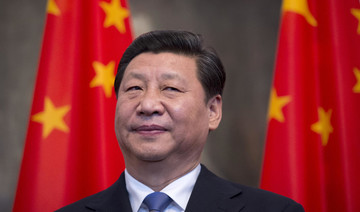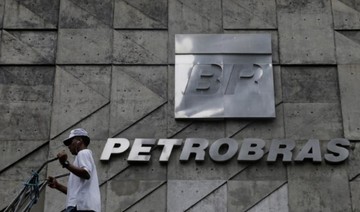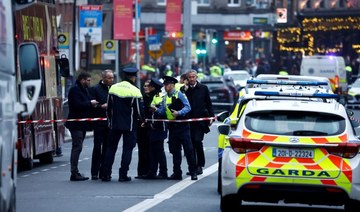CAPE TOWN: Foreign ministers from the BRICS countries are meeting in South Africa from Thursday as the five-nation bloc seeks to forge itself into a counterweight to Western geopolitical dominance in the wake of Russia’s invasion of Ukraine.
The talks are a prelude to an August summit in Johannesburg that has already created controversy because of the possible attendance of Russian President Vladimir Putin, the target of an International Criminal Court (ICC) arrest warrant.
It accused him in March of the war crime of forcibly deporting children from Russian-occupied territory in Ukraine. Moscow denies the allegations. South Africa had already invited Putin in January.
South African authorities confirmed that foreign ministers from Brazil, Russia, India, and South Africa are attending Thursday’s meeting in Cape Town. A deputy minister is representing China.
No agenda has been made public, but analysts said discussions would aim to deepen ties among existing members and consider an expansion of the group.
“BRICS is positioning itself as an alternative to the West and as a way to make space for emerging powers,” said Cobus van Staden of the South African Institute of International Affairs.
Once viewed as a loose, largely symbolic association of disparate emerging economies, BRICS has in recent years taken more concrete shape, driven initially by Beijing and, since the start of the Ukraine war in February 2022, with added impetus from Moscow.
Discussions of BRICS’ New Development Bank, which stopped funding projects in Russia to comply with sanctions, were expected on Thursday, a South African foreign ministry source said.
Amid the growing geopolitical polarization resulting from the war in Ukraine, BRICS leaders have said they are open to admitting new members, including oil producing countries.
Venezuela, Argentina, Iran, Algeria, Saudi Arabia and the United Arab Emirates are on a list of those who have either formally applied to join or expressed interest, officials said.
“If they can bring in the oil producer countries that will be key, given the petrodollar system,” said William Gumede, a South African political analyst who has written extensively on BRICS.
South Africa, though the bloc’s smallest member, is among its biggest champions.
Its preparations for the Aug. 22-24 summit, however, have been complicated by the ICC announcement on Putin.
As an ICC member South Africa would face pressure to arrest Putin, were he to attend the meeting in Johannesburg.
Putin has not confirmed his plans, with the Kremlin only saying Russia would take part at the “proper level.”
South Africa’s position is unclear. Pretoria has said it will honor its obligations under its ICC membership, but the government is still weighing the possibility of hosting Putin or even moving the summit to China.
Independent political analyst Nic Borain said the government was caught between its support for BRICS and friendship with Russia on one side and the looming backlash from vital Western economic partners on the other.
“Obviously, the best solution for South Africa is if Putin decided not to come.”
BRICS ministers meet in push to establish group as counterweight to West
https://arab.news/577m5
BRICS ministers meet in push to establish group as counterweight to West
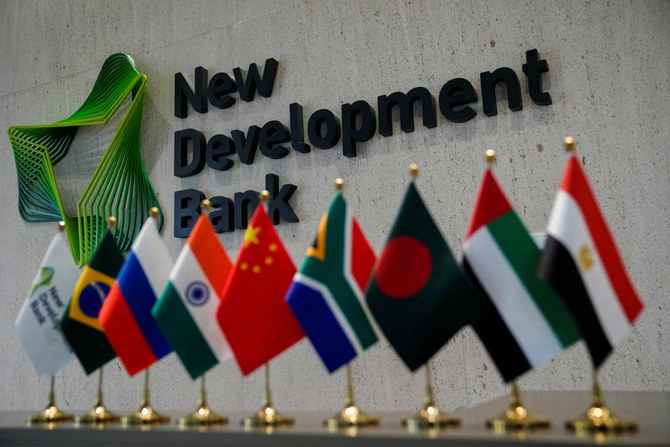
- Talks a prelude to an August summit in Johannesburg that has already created controversy
- BRICS has in recent years taken more concrete shape, driven initially by Beijing
Netherlands remembers World War Two dead amid tight security due to Gaza war
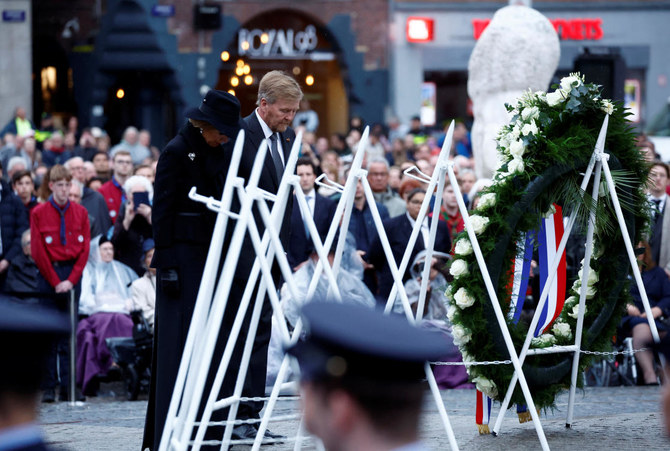
- Normally some 20,000 people attend the Dam commemoration
- Earlier this week municipal authorities announced unprecedented security measures to keep the ceremony safe and avoid possible disruptions linked to the Israel-Hamas war
AMSTERDAM: Dutch King Willem-Alexander and Prime Minister Mark Rutte joined around 4,000 people on Saturday for the country’s annual World War Two remembrance ceremony amid restricted public access and heightened security due to the war in Gaza.
The ceremony on Amsterdam’s central Dam square, with the traditional two minutes of silence at 8 p.m. (1800 GMT) to commemorate the victims of World War Two, passed smoothly despite fears that there might be protests.
Normally some 20,000 people attend the Dam commemoration without having to register. But earlier this week municipal authorities announced unprecedented security measures to keep the ceremony safe and avoid possible disruptions linked to the Israel-Hamas war.
At the opening of a Holocaust Museum in Amsterdam in March, pro-Palestinian protesters opposed to Israel’s military campaign in Gaza set off fireworks and booed Israeli President Isaac Herzog as he arrived on a visit.
Every town and the city in the Netherlands holds its own remembrance ceremony on May 4 and tens of thousands of people attend the events. The Netherlands then marks on May 5 the anniversary of its liberation from Nazi occupation in 1945.
Drone footage shows Ukrainian village battered to ruins as residents flee Russian advance
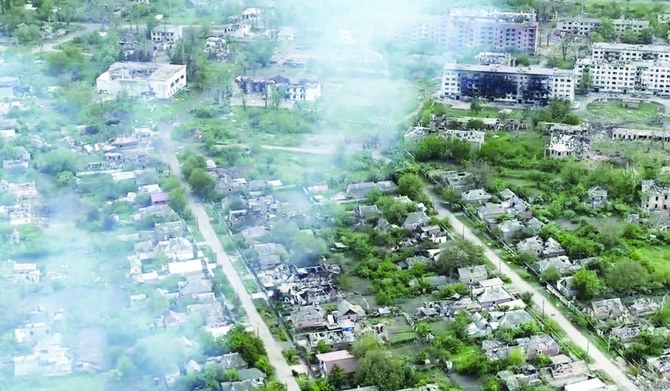
- Residents have scrambled to flee the village, among them a 98-year-old woman who walked almost 10 kilometers (6 miles) alone last week, wearing a pair of slippers and supported by a cane, until she reached Ukrainian front lines
KYIV: The Ukrainian village of Ocheretyne has been battered by fighting, drone footage obtained by The Associated Press shows. The village has been a target for Russian forces in the Donetsk region of eastern Ukraine.
Russian troops have been advancing in the area, pounding Kyiv’s depleted, ammunition-deprived forces with artillery, drones and bombs. Ukraine’s military has acknowledged the Russians have gained a “foothold” in Ocheretyne, which had a population of about 3,000 before the war, but says that fighting continues.
Residents have scrambled to flee the village, among them a 98-year-old woman who walked almost 10 kilometers (6 miles) alone last week, wearing a pair of slippers and supported by a cane, until she reached Ukrainian front lines.
FASTFACT
Ukraine’s military has acknowledged the Russians have gained a “foothold” in Ocheretyne, which had a population of about 3,000 before the war, but says that fighting continues.
Not a single person is seen in the footage, and no building in Ocheretyne appears to have been left untouched by the fighting. Most houses, apartment blocks and other buildings look damaged beyond repair, and many houses have been pummeled into piles of wood and bricks. A factory on the outskirts has also been badly damaged.
The footage also shows smoke billowing from several houses, and fires burning in at least two buildings.
Elsewhere, Russia has in recent weeks stepped up attacks on Kharkiv, Ukraine’s second-largest city, in an attempt to pummel the region’s energy infrastructure and terrorize its 1.3 million residents.
Four people were wounded and a two-story civilian building was damaged and set ablaze overnight after Russian forces struck Kharkiv, in northeastern Ukraine, with exploding drones, regional governor Oleh Syniehubov said Saturday.
The four, including a 13-year-old, were hurt by falling debris, he said on the Telegram messaging app.
Russian state agency RIA reported Saturday reported that Moscow’s forces struck a drone warehouse in Kharkiv that had been used by Ukrainian troops overnight, citing Sergei Lebedev, described as a coordinator of local pro-Moscow guerrillas. His comments could not be independently verified.
Syniehubov said Russia also bombed Kharkiv on Friday, damaging residential buildings and sparking a fire. An 82-year-old woman died and two men were wounded.
Ukraine’s military said Russia launched a total of 13 Shahed drones at the Kharkiv and Dnipropetrovsk regions of eastern Ukraine overnight, all of which were shot down by Ukrainian air defenses.
Students in Ireland, Switzerland join the protest wave over Gaza

- Dublin students build encampment, forcing university to restrict campus access and close Book of Kells exhibition
DUBLIN: Students at Trinity College Dublin and Lausanne University in Switzerland have staged occupations to protest against Israel’s war in Gaza, joining a wave of demonstrations sweeping US campuses.
In Dublin, students built an encampment on Friday, forcing the university to restrict campus access on Saturday and close the Book of Kells exhibition, one of Ireland’s top tourist attractions.
The camp was set up after the students’ union said the university had fined it €214,000 ($230,000) for losses caused by protests in recent months, not exclusively over Gaza.
The protesters were demanding that Trinity cut academic ties with Israel and divest from companies with ties to Israel.
BACKGROUND
The protesters were demanding that Trinity College Dublin cut academic ties with Israel and divest from companies with ties to Israel.
Students’ union president Laszlo Molnarfia posted a photograph of benches piled up at the entrance to the building housing the Book of Kells, an illuminated manuscript created by Celtic monks in about 800 AD.
Trinity College said it had restricted access to students, staff, and residents to ensure safety and that the exhibition would be closed on Saturday.
More than 34,600 Palestinians have been killed in Israel’s seven-month-old assault on the Gaza Strip, say health officials in the enclave.
The war began when Hamas militants attacked Israel on Oct. 7.
Pro-Palestinian protests have also been held at universities in Australia and Canada.
In Lausanne, around 100 students occupied a building to back demands, including an end to scientific cooperation with Israel.
“Palestinians have been dying for over 200 days, but we are not being heard,” one protester told Swiss television on Saturday.
“There’s a global movement to get governments to take action, but it’s not happening. That’s why we want to get universities involved now.”
The university said the occupation could continue until Monday, provided it did not disrupt work on campus.
“We universities are not called upon to take political stands,” the university’s rector, Frederic Herman, told RTS radio.
Last week, the head of Trinity College, Linda Doyle, said it was reviewing its investments but that it was for individual academics to decide whether to work with Israeli institutions.
Sadiq Khan, Pakistani immigrant bus driver’s son, makes history by winning third term as London mayor
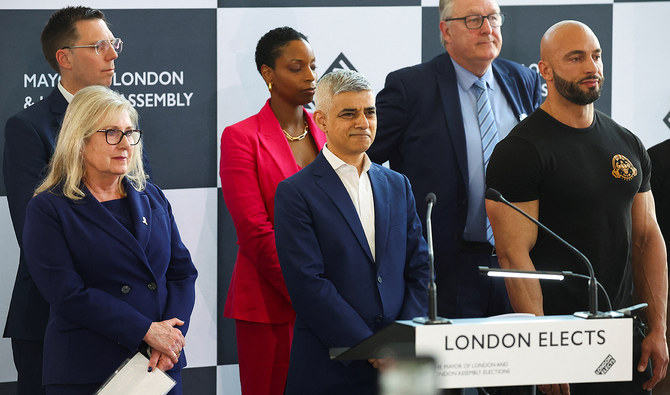
- Khan, an official with global renown, became the first Muslim mayor of a Western capital when elected in 2016
- Born in London in 1970, he grew up in public housing the Tooting area and slept in a bunk-bed until he was 24
LONDON: Sadiq Khan, who was Saturday re-elected for a record third term as London mayor, rose from humble roots to spar with world leaders and bring consequential change to the British capital.
The 53-year-old Labor party politician – a former human rights lawyer brought up on a London public housing complex – comfortably defeated Conservative rival Susan Hall for a third stint at City Hall.
He now overtakes predecessor Boris Johnson as the longest-serving holder of the post, which notably has powers over the emergency services, transport and planning in the city of nearly nine million.
Victory continues a remarkable journey for the Pakistani immigrant bus driver’s son, who became the first Muslim mayor of a Western capital when initially elected in 2016.
As mayor, he has made a name for himself as a vocal critic of Brexit and successive Conservative prime ministers, including Johnson, as well as for a feud with former US president Donald Trump.
The pair became embroiled in an extraordinary war of words after Khan criticized Trump’s travel ban on people from certain Muslim countries.
Trump then accused Khan of doing a “very bad job on terrorism” and called him a “stone cold loser” and a “national disgrace.”
The mayor in turn allowed an infamous blimp of Trump dressed as a baby in a nappy to fly above protests in Parliament Square during his 2018 visit to Britain.
“He once called me a stone cold loser. Only one of us is a loser, and it’s not me,” Khan told AFP during his 2021 campaign.
But Khan’s own tenure has not been without its controversies, particularly over last year’s expansion of an Ultra-Low Emission Zone into the largest pollution-charging scheme in the world.
The daily toll on the most-polluting vehicles prompted a fierce backlash in outer boroughs of Greater London, with anger at the extra financial burden during a cost-of-living crisis.
Khan has also been criticized for failing to get to grips with high levels of knife crime and since last year, his handling of large weekly pro-Palestinian protests.
Born in London in 1970 to parents who had recently arrived from Pakistan, Khan was the fifth child out of seven brothers and one sister.
He grew up in public housing in Tooting, an ethnically mixed residential area in south London, and slept in a bunk-bed until he was 24.
His modest background plays well in a city that is proud of its diversity and loves a self-made success story.
Khan still regularly recalls how his father drove one of London’s famous red buses, and his mother was a seamstress.
He is a handy boxer, having learnt the sport to defend himself in the streets against those who hurled racist abuse at him, and two of his brothers are boxing coaches.
He initially wanted to become a dentist, but a teacher spotted his gift for verbal sparring and directed him toward law.
He gained a law degree from the University of North London and started out as a trainee lawyer in 1994 at the Christian Fisher legal firm, where he was eventually made a partner.
He specialized in human rights, and spent three years chairing the civil liberties campaign group Liberty.
He represented Louis Farrakhan, leader of the Nation of Islam movement, and Babar Ahmad, a mosque acquaintance who was jailed in the United States after admitting providing support to the Taliban regime in Afghanistan.
Khan joined Labor aged 15 when Conservative prime minister Margaret Thatcher was in her pomp.
He became a local councilor for Tooting in the Conservative-dominated Wandsworth local borough in 1994, and its member of parliament in 2005.
He still lives in the area with his lawyer wife Saadiya and their two teenage daughters.
Labor prime minister Gordon Brown made him communities minister in 2008 and he later served as transport minister, becoming the first Muslim minister to attend Cabinet meetings.
In parliament, he voted for gay marriage – which earned him death threats.
As mayor, he vowed to focus on providing affordable homes for Londoners and freezing transport fares, but – like many in power around the world – saw his agenda engulfed by the pandemic.
He is London’s third mayor after Labor’s Ken Livingstone (2000-2008) and Johnson (2008-2016), with widespread speculation he could eventually try to follow in his predecessor and become prime minister.
London mayor Khan wins historic third term as Tories routed in local polls

- Khan, 53, easily beat Tory challenger Susan Hall to scupper largely forlorn Tory hopes that they could prise the UK capital away from Labour for the first time since 2016
- In the West Midlands, where Tory incumbent Andy Street is bidding for his own third term, votes were reportedly being recounted and too close to call
LONDON: London’s Labour mayor Sadiq Khan on Saturday secured a record third term, dealing the Conservatives another damaging defeat in their worst local election results in recent memory months before an expected general election.
Khan, 53, easily beat Tory challenger Susan Hall to scupper largely forlorn Tory hopes that they could prise the UK capital away from Labour for the first time since 2016.
The first Muslim mayor of a Western capital when first elected then, he had been widely expected to win as Labour surge nationally and the Conservatives suffer in the polls.
In the end, he saw his margin of victory increase compared to the last contest in 2021.
It adds to a dismal set of results for Prime Minister Rishi Sunak, as his Tories finished a humiliating third in local council tallies after losing nearly 500 seats in voting Thursday across England.
With Labour making huge gains, the beleaguered leader’s Conservatives lost crunch mayoral races in Manchester, Liverpool, Yorkshire as well as the capital and elsewhere.
In the West Midlands, where Tory incumbent Andy Street is bidding for his own third term, votes were reportedly being recounted and too close to call.
An unexpected Tory defeat there could leave Sunak with only one notable success: its mayor winning a third term in Tees Valley, northeast England — albeit with a vastly reduced majority.
Writing in Saturday’s Daily Telegraph, Sunak conceded “voters are frustrated” but insisted “Labour is not winning in places they admit they need for a majority.”
“We Conservatives have everything to fight for,” Sunak argued.
Labour, out of power since 2010 and trounced by Boris Johnson’s Conservatives at the last general election in 2019, also emphatically snatched a parliamentary seat from the Conservatives.
It seized on winning the Blackpool South constituency and other successes to demand a national vote.
“Let’s turn the page on decline and usher in national renewal with Labour,” party leader Keir Starmer told supporters Saturday in the East Midlands, where the party won the mayoral race.
Sunak must order a general election be held by January 28 next year at the latest, and has said he is planning on a poll in the second half of 2024.
Labour has enjoyed double-digit poll leads for all of Sunak’s 18 months in charge, as previous Tory scandals, a cost-of-living crisis and various other issues dent the ruling party’s standing.
On Thursday, they were defending nearly 1,000 council seats, many secured in 2021 when they led nationwide polls before the implosion of Johnson’s premiership and his successor Liz Truss’s disastrous 49-day tenure.
With almost all those results in by Saturday afternoon, they had lost close to half and finished third behind the smaller centrist opposition Liberal Democrats.
If replicated in a nationwide contest, the tallies suggested Labour would win 34 percent of the vote, with the Tories trailing by nine points, according to the BBC.
Sky News’ projection for a general election using the results predicted Labour will be the largest party but short of an overall majority.
Its by-election scalp in Blackpool — on a mammoth 26-percent swing — was the Conservatives’ 11th such loss in this parliament, the most by any government since the late 1960s.
Speculation has been rife in Westminster that restive Tory lawmakers could use the dire local election results to try to replace him. But that prospect seems to have failed to materialize.
However, it was not all good news for Labour.
The party lost control of one local authority, and suffered some councillor losses to independents elsewhere, due to what analysts said was its stance on the Israel-Hamas war.
Polling expert John Curtice assessed there were concerning signs for the opposition.
“These were more elections in which the impetus to defeat the Conservatives was greater than the level of enthusiasm for Labour,” he noted in the i newspaper.
“Electorally, it is still far from clear that Sir Keir Starmer is the heir to (Tony) Blair.”



